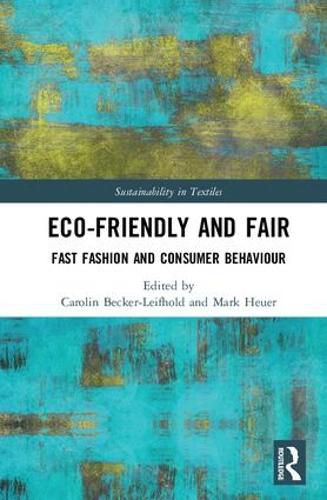Readings Newsletter
Become a Readings Member to make your shopping experience even easier.
Sign in or sign up for free!
You’re not far away from qualifying for FREE standard shipping within Australia
You’ve qualified for FREE standard shipping within Australia
The cart is loading…






The make-take-waste paradigm of fast fashion explains much of the producer and consumer behavior patterns towards fast fashion. The evolution from a two-season fashion calendar to fast fashion, characterized by rapid product cycles from retailers and impulse buying by consumers, presents new challenges to the environment, workplace and labour practices.
This book provides a comprehensive overview of new insights into consumer behaviour mechanisms in order to shift practices toward sustainable fashion and to minimize the negative impacts of fast fashion on the environment and society. Concepts and techniques are presented that could overcome the formidable economic drivers of fast fashion and lead toward a future of sustainable fashion.
While the need for change in the fashion industry post-Rana Plaza could not be more obvious, alternative and more sustainable consumption models have been under-investigated. The paucity of such research extends to highly consumptive consumer behaviours regarding fast fashion (i.e. impulse buying and throwaways) and the related impediments these behaviours pose for sustainable fashion.
Written by leading researchers in the field of sustainable fashion and supported by the Textile Institute, this book evaluates fashion trends, what factors have led to new trends and how the factors supporting fast fashion differ from those of the past. It explores the economic drivers of fast fashion and what social, environmental and political factors should be maintained, and business approaches adopted, in order for fast fashion to be a sustainable model. In particular, it provides consumer behaviour concepts that can be utilized at the retail level to support sustainable fashion.
$9.00 standard shipping within Australia
FREE standard shipping within Australia for orders over $100.00
Express & International shipping calculated at checkout
The make-take-waste paradigm of fast fashion explains much of the producer and consumer behavior patterns towards fast fashion. The evolution from a two-season fashion calendar to fast fashion, characterized by rapid product cycles from retailers and impulse buying by consumers, presents new challenges to the environment, workplace and labour practices.
This book provides a comprehensive overview of new insights into consumer behaviour mechanisms in order to shift practices toward sustainable fashion and to minimize the negative impacts of fast fashion on the environment and society. Concepts and techniques are presented that could overcome the formidable economic drivers of fast fashion and lead toward a future of sustainable fashion.
While the need for change in the fashion industry post-Rana Plaza could not be more obvious, alternative and more sustainable consumption models have been under-investigated. The paucity of such research extends to highly consumptive consumer behaviours regarding fast fashion (i.e. impulse buying and throwaways) and the related impediments these behaviours pose for sustainable fashion.
Written by leading researchers in the field of sustainable fashion and supported by the Textile Institute, this book evaluates fashion trends, what factors have led to new trends and how the factors supporting fast fashion differ from those of the past. It explores the economic drivers of fast fashion and what social, environmental and political factors should be maintained, and business approaches adopted, in order for fast fashion to be a sustainable model. In particular, it provides consumer behaviour concepts that can be utilized at the retail level to support sustainable fashion.